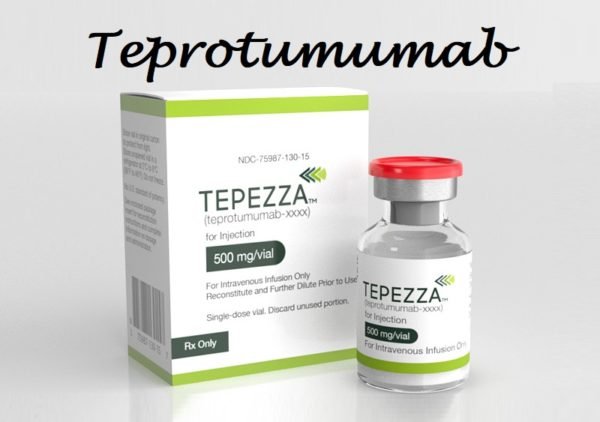The FDA approved Teprotumumab (Tepezza Horizon Therapeutics) for thyroid eye disease on the 21st of January of 2020. Thyroid eye disease or thyroid ophthalmopathy or Graves ophthalmopathy is a relatively common condition. It may manifest as eye swelling, redness, double vision, eye pain, and rarely blindness. B-cell mediated autoimmunity is the hallmark of graves disease. TSH receptors are also thought to be present on the adipocytes and fibroblasts of the orbit. These receptors are thought to be the major target of the immunoglobulins that are directed against these receptors. Limited options are available for the treatment of patients with Thyroid associated ophthalmopathy. Most patients are treated with selenium, glucocorticoids, and immunomodulators. Monoclonal antibodies targeting B-cells like Rituximab has been studied in small clinical trials in these patients and found to be effective [Ref]. Other options include supportive treatments like radiation and surgical interventions.
IGF-1 targeted therapy for thyroid eye disease:
Recently, inhibition of IGF-1 (Insulin-like growth factor) has been emerging as a new therapeutic strategy for the treatment of thyroid-associated ophthalmopathy. The IGF-1 receptor is a tyrosine kinase receptor that acts synergistically with thyrotropin and also regulates the immune function. Insulin-like growth factor inhibitor therapy consists of either tyrosine kinase inhibitors or monoclonal antibodies directed against IGF-1 receptors. Several IGF-1 receptors directed monoclonal antibodies are currently being used as chemotherapeutic agents. These include Ganitumab, dalotuzumab, cixutumumab, teprotumumab, and figitumumab. Teprotumumab (Tepezza) is an insulin-like growth factor 1 receptor inhibitory monoclonal antibody. Hyperglycemia is a very common side effect of this drug. Teprotumumab (Tepezza) was studied in patients with thyroid eye disease. The clinical trial was conducted over 24 weeks. Teprotumumab (Tepezza) was found to be effective in reducing proptosis and improving the clinical activity scores in patients with active moderate to severe thyroid-associated ophthalmopathy [Ref].
Side effects of Teprotuzumab include:
- Muscle spasm,
- Nausea,
- Alopecia,
- diarrhea,
- fatigue,
- hyperglycemia,
- hearing loss,
- dry skin,
- dysgeusia (altered sense of taste), and
- headache.







